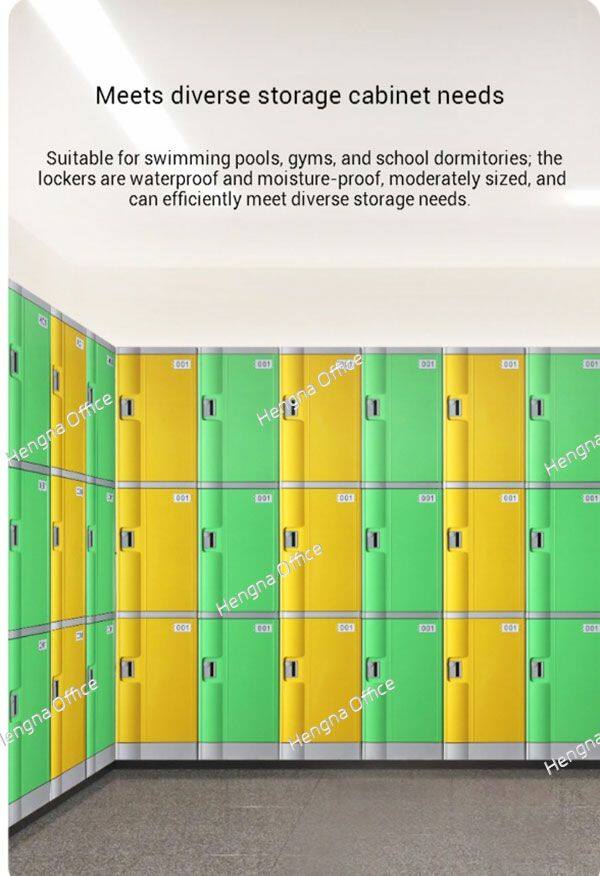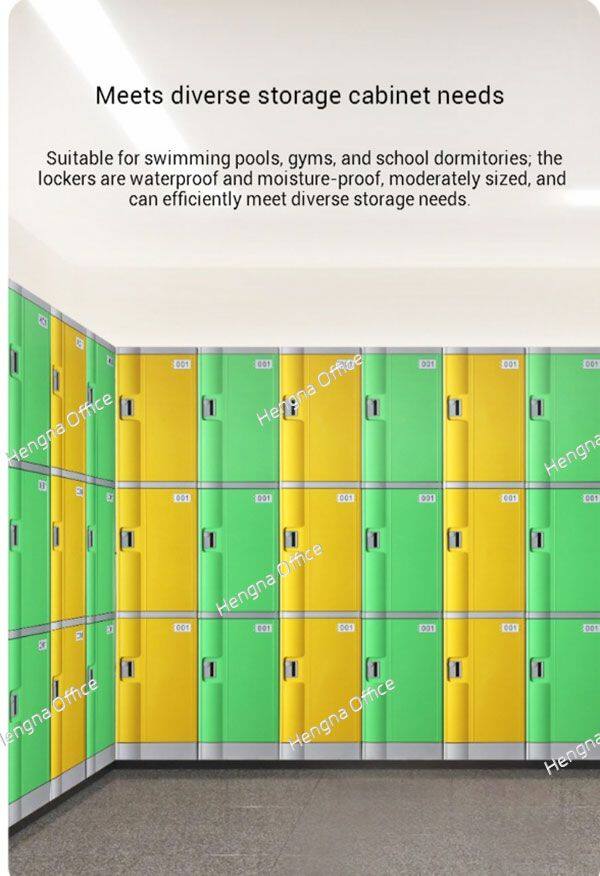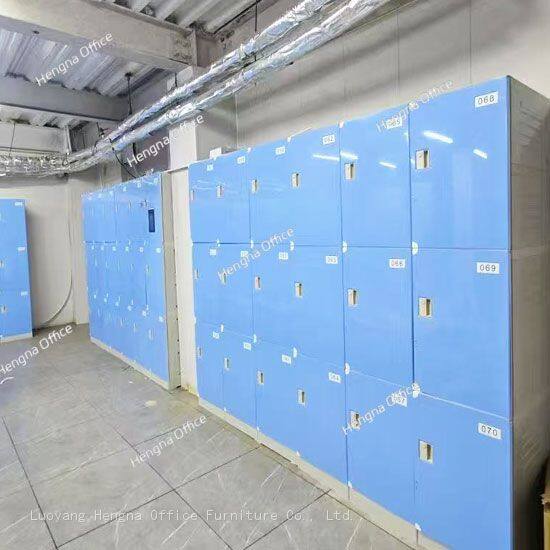Home > Blog > Why Waterproof Plastic Lockers Are Essential for Swimming Pool Facilities: Top 7 Durability and Safe
-
 Sarah
Hi there! Welcome to my shop. Let me know if you have any questions.
Sarah
Hi there! Welcome to my shop. Let me know if you have any questions.
Your message has exceeded the limit.

Why Waterproof Plastic Lockers Are Essential for Swimming Pool Facilities: Top 7 Durability and Safe
2025-10-21 17:26:00
Swimming pool facilities present unique challenges when it comes to storage solutions. The constant presence of moisture, chlorine, and high humidity creates an environment that can quickly deteriorate traditional metal lockers, compromising both their functionality and safety. In recent years, facility managers and aquatic center operators have increasingly turned to waterproof plastic lockers as the optimal solution for these demanding environments. This comprehensive guide explores the top seven durability and safety benefits that make waterproof plastic lockers an essential investment for any swimming pool facility.

The Environmental Challenges of Pool Facilities
Before diving into the benefits of waterproof plastic lockers, it’s important to understand the harsh conditions they must withstand:
Constant Moisture Exposure: Pool areas experience persistent humidity and direct water contact, creating an environment where corrosion and deterioration are constant threats.
Chemical Exposure: Chlorine and other pool chemicals can accelerate material degradation, causing metal lockers to rust and deteriorate rapidly.
Temperature Fluctuations: The transition between wet and dry areas, combined with varying temperatures throughout the day, puts additional stress on storage materials.
High Traffic Usage: Swimming pools typically experience heavy usage, with lockers being opened and closed frequently throughout the day.
Top 7 Durability and Safety Benefits of Waterproof Plastic Lockers
1. Superior Corrosion Resistance
Perhaps the most significant advantage of waterproof plastic lockers is their exceptional resistance to corrosion:
Complete Immunity to Rust: Unlike metal lockers, plastic lockers will never rust, regardless of moisture exposure or chemical contact.
Chlorine Resistance: High-quality plastic materials are impervious to the corrosive effects of chlorine and other pool chemicals.
Saltwater Compatibility: For facilities with saltwater pools, plastic lockers offer superior performance compared to metal alternatives.
Table: Corrosion Resistance Comparison
| Material | Rust Resistance | Chlorine Resistance | Saltwater Resistance | Expected Lifespan in Pool Environment |
|---|---|---|---|---|
| Steel | Poor | Poor | Poor | 2-3 years |
| Aluminum | Moderate | Poor | Moderate | 3-5 years |
| Stainless Steel | Good | Moderate | Good | 5-7 years |
| HDPE Plastic | Excellent | Excellent | Excellent | 15+ years |
2. Enhanced Durability and Impact Resistance
Waterproof plastic lockers are engineered to withstand the rigorous demands of pool environments:
High-Impact Resistance: Quality plastic lockers can withstand direct impacts without denting or deforming, unlike metal alternatives.
Structural Integrity: Advanced manufacturing techniques ensure that plastic lockers maintain their shape and function even under heavy use.
Crack Prevention: Premium plastic materials are formulated to resist cracking and breaking, even in temperature-variable environments.
3. Improved Safety Features
Safety is paramount in any public facility, and waterproof plastic lockers offer several advantages:
Smooth, Rounded Edges: Unlike metal lockers that may have sharp edges, plastic lockers typically feature smooth, rounded designs that reduce injury risks.
Non-Conductive Material: Plastic lockers eliminate electrical conductivity hazards, an important consideration in wet environments.
Splinter-Free Construction: Unlike wood alternatives, plastic lockers won’t splinter or create sharp fragments over time.

4. Hygienic and Easy to Clean
Maintaining hygiene in pool facilities is essential, and plastic lockers offer significant advantages:
Non-Porous Surface: High-quality plastic lockers feature non-porous surfaces that resist bacterial growth and are easy to sanitize.
Simple Cleaning Protocol: Plastic lockers can be cleaned with standard disinfectants without risk of material degradation.
Mold and Mildew Resistance: Properly formulated plastic materials resist mold and mildew growth, even in constantly humid environments.
5. Low Maintenance Requirements
Facility managers appreciate the reduced maintenance burden associated with plastic lockers:
No Painting Required: Unlike metal lockers that may need periodic repainting, plastic lockers maintain their appearance without additional maintenance.
No Rust Treatment: The absence of corrosion eliminates the need for rust treatment or protective coatings.
Minimal Repairs: The durability of plastic lockers means fewer repairs and replacements over their lifespan.
6. Aesthetic Versatility and Longevity
Waterproof plastic lockers maintain their appearance far longer than alternatives:
Color Retention: High-quality plastic lockers resist fading and maintain their vibrant colors even with constant UV exposure from pool area windows.
Design Flexibility: Plastic lockers are available in various colors and designs to complement facility aesthetics.
Consistent Appearance: Unlike metal lockers that may show wear and tear, plastic lockers maintain a consistent, professional appearance throughout their lifespan.
7. Environmental Sustainability
Modern plastic lockers offer environmental benefits that align with sustainable facility management:
Recyclable Materials: Many plastic lockers are made from recyclable materials and can be recycled at the end of their lifespan.
Long Service Life: The extended durability of plastic lockers means fewer replacements and reduced environmental impact over time.
Energy Efficient Production: The manufacturing process for plastic lockers typically requires less energy than metal alternatives.
Implementation Considerations for Pool Facilities
When selecting waterproof plastic lockers for swimming pool facilities, consider these factors:
Size and Configuration Options
Single-Tier Lockers: Ideal for storing larger items like towels, bags, and personal belongings.
Multi-Tier Configurations: Maximize space efficiency in high-traffic areas.
Customizable Compartments: Some plastic locker systems offer adjustable shelving and compartment options.
Locking Mechanism Choices
| Lock Type | Advantages | Best For |
|---|---|---|
| Key Lock | Traditional security, familiar to users | General public areas |
| Combination Lock | No keys to manage, user-controlled access | School pools, community centers |
| Electronic Lock | Advanced security, audit trail capabilities | Premium facilities, membership clubs |
| Padlock Compatible | User-provided security, flexible options | Multi-purpose facilities |
Case Study: Successful Implementation at Aquatic Centers
Several leading aquatic facilities have reported significant benefits after switching to waterproof plastic lockers:
Metro Aquatic Center: Reported a 70% reduction in locker maintenance costs over a five-year period.
Sunset Community Pool: Extended locker replacement cycle from 5 years (metal) to 15+ years (plastic).
University Recreation Center: Improved user satisfaction scores by 35% after installing plastic lockers with enhanced ventilation features.
Tags: Waterproof Plastic Lockers, Waterproof Plastic Lockers Are Essential, Waterproof Plastic Lockers for Swimming Pool Facilities

